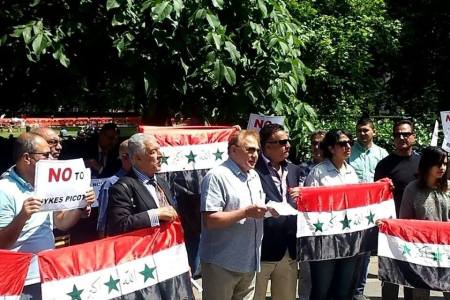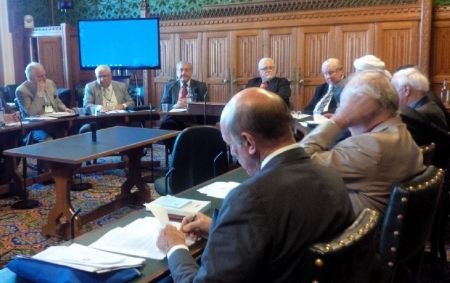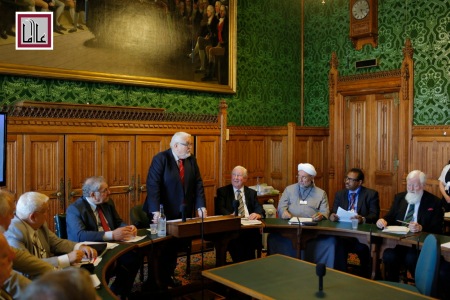Reposted from One Small Window
http://onesmallwindow.wordpress.com/2014/06/23/iraq-all-going-to-plan/
On 10 June, the on-going violence in Iraq literally exploded back onto the international mainstream media’s radar, and consequently into the public conscience, when militants took control of Iraq’s second city of Mosul and expelled the Iraqi army. Since then, there has been talk of possible foreign military intervention to assist an Iraqi government that appears to have more support abroad than at home.
Explosions are not uncommon in Iraq. The United Nations’ conservative estimate of almost 8000 civilian casualties in 2013 made it the bloodiest twelve months in recent years; this figure does not include the injured. In the first half of 2014, that violence has continued to spiral out of control. At the end of May, Human Rights Watch (HRW) stated that the Iraqi government’s indiscriminate strikes on Fallujah General Hospital and attacks on residential neighbourhoods with barrel bombs could “constitute a serious violation of the laws of war” in its intensifying struggle against armed groups opposed to it.
On 10 May, following information he received in this respect from Iraqi MP Leghah Vardi, Scottish Conservative MEP and President of the European Parliament’s Delegation for Relations with Iraq Struan Stevenson issued the following statement:
“We must not ignore her pleas for help. Nouri al Maliki is waging all-out war on men, women and children in Anbar Province, simply because they are Sunni. It is shameful that the West chooses to ignore this genocide and worse still, actively supports Maliki to the point of the US even supplying him with weapons, which he uses to kill his own people. The UN, US and EU seem to have fallen hook, line and sinker for his assertion that he is fighting against al-Qaeda affiliated terrorists (Daesh*). The photographs of dead and dying children in Fallujah expose this as a blatant lie.”
Iraq has long been in a state of war: the current focus grants politicians and the media a welcome respite from other crises, such as that in Afghanistan. Iraqis remain marginalised from the mainstream discourse about their country, yet the threat of sectarianism, balkanisation, and devastation and insecurity in the country are not recent concerns.

Iraqis call for peace and no foreign intervention outside London US Embassy, 21 June, photo credit: John Davies
In 2010, a year before the US withdrawal from Iraq, US-backed candidate Nouri Al-Maliki became Prime Minister in elections that were reported to be fair and democratic, but produced no outright winner. The crackdown on dissidents started almost immediately. According toChelsea Manning, a former US army intelligence analyst serving in Iraq at the time, reports came in of “a brutal crackdown against political dissidents by the Iraqi Ministry of Interior and federal police, on behalf of Prime Minister Nuri Kamal al-Maliki. Detainees were often tortured, or even killed”. His leadership started as it has gone on.
A few months later, in an energy-rich country, two people were killed in Basra when police opened fire on protesters complaining about severe power shortages during daily summer temperatures in excess of 50oC. In 2011, Iraq experienced its own ‘Arab Spring’ in protest against corruption and unemployment. Mass arrests, arbitrary detention and sentences, torture, a soaring execution rate coupled with a violent response to peaceful protest led to more protests in 2012 and the current out-of-control cycle of violence. The human rights situation has deteriorated considerably under Al-Maliki. Dissent has been quelled and debate on fundamental issues silenced through the labelling of any opposition as terrorism and the arbitrary use of the Counter-terrorism Law, in particular Article 4 which imposes the death penalty. In view of the on-going violence and mass internal displacement of Iraqis in various provinces, doubt has been cast over the result of the latest elections on 30 April, which saw a huge turnout and a solid win for Al-Maliki.
It is perhaps then ironic that on the very day that the world was suddenly reminded of the plight of the Iraqi people, a group of Iraqi activists in the UK, led by the Arab Lawyers Association and the Rafidain Centre for Strategic Studies, held a meeting, even more ironically subtitled “What Next?” on the 11th year of the occupation of Iraq in the Houses of Parliament in Westminster to raise some of these issues.
The meeting was opened by one of its co-sponsors, Lord Maginnis of Drumglass who asked whether western governments and the media were ignoring the situation in Iraq as a result of a guilty conscience. He also questioned why the Iraqi people still lacked basic infrastructure facilities, and suffered mass unemployment and corruption. He accused Al-Maliki of creating a “Mafia-like network” in the country to silence dissent at all levels and that although he presents the current situation as sectarian strife, he has successfully marginalised other groups in the country too, such as the Kurds. Writing on 15 June in The Huffington Post, Maginnis placed the blame for the current situation in Iraq squarely on Al-Maliki’s shoulders and stated “What happened in Mosul and is now spreading towards Baghdad is a demand for accountability in Iraq. This is what the West including the UK and the US should be actively promoting. Maliki wants to declare a state of emergency in the country. One must immediately ask, “A state of emergency for whom, given that this uprising is a surge by the people of Iraq”.
He was followed by Iraqi lawyer Sabah Al-Mukhtar, who stated that the origins of the problem go all the way back to the first Iraq War in 1991. He accused the Al-Maliki regime of using three tactics – the illusion of sectarian strife, the gloss of democracy, and the claim that his democratic regime is fighting Al Qaeda to undermine the rights of the Iraqi people by calling any opponent of his a “terrorist”. With almost 1000 deaths each month, he described the violence the Iraqi people face every day – massacres, rape, executions, torture – as tantamount to a “war crime”. The situation in Iraq is not a natural disaster, but is completely man-made. He stated that even during international sanctions in the 1990s Iraq had a better and more viable infrastructure than it currently has even though the current government has an income in excess of $100 billion per year to provide such basic services as roads, hospitals and schools. He stated that the political system had been created by foreign powers – the US and Iran in particular – to ensure Al-Maliki remains in power. Like other speakers, he called for accountability and an end to impunity for crimes against the Iraqi people, as well as the reinstatement of a UN Special Rapporteur on Iraq.
Another speaker was former Assistant Secretary-General of the United Nations Denis Halliday, who stated that the UN has consistently failed Iraq over the past 24 years and the country destroyed by those with interests in its oil and acquiring a strategic military presence for themselves in the Middle East. He called UN sanctions a “form of warfare” that were catastrophic for the country. He accused the UN and western powers of double standards on Iraq for the failure to admit their own fault and hold themselves and others accountable for the situation there. Instead, with on-going arms sales to the regime there, western powers have an interest in maintaining the violent situation. He called the situation unacceptable and called for accountability as well as demanding reparations for the Iraqi people. Following the Iraqi invasion of Kuwait in 1990, Iraq paid reparations in excess of $50 billion, yet ordinary Iraqi civilians who have been displaced internally, forced into seeking asylum abroad and whose country has been devastated have not been compensated for over two decades of foreign interference. Out of the 5 million Iraqis who are displaced within the country, over 80% are women and children, many of whom are widows and orphans.
Hans Christof Graf von Sponeck, who replaced Halliday when he resigned from the UN over sanctions against Iraq and later resigned for the same reason, spoke as well, also criticising the UN’s role in the current situation as well as the results of the humanitarian crisis it created. He illustrated this hypocritical stance by stating that the Oil-for-Food Programme, designed to curb Iraq’s weapons of mass destruction, had itself became a weapon of mass destruction. It has in part led to the current humanitarian crisis which sees a large proportion of Iraqis living in poverty, without access to clean water, health care and education. He demanded an end to impunity and accountability for all those responsible for crimes in Iraq, and for Britain to publish the findings of the Chilcot Inquiry.
An interesting contribution was made by former Iraqi Oil Minister Issam Al-Chalabi who declared the 2003 war a war for oil, with the US interfering from the outset to break Iraq down into Sunni, Shi’ite and Kurdish areas. The US then started working on an Iraq oil law to award Iraqi oil concessions to international companies. As no political permission was given for such a measure, the US went ahead and made such contracts all the same, awarding over 80% of contracts to foreign companies, bypassing the legal process. Similar methods were then used in the Kurdistan region. Consequently, foreign companies now have control over Iraqi oil. Increasing oil prices have created greater profits for these companies but come at a larger cost to Iraqis who have to buy their own oil back from them. Iraqi oil has created revenue of over $700 million since 2003, but the country itself has nothing to show for it. Instead, Iraq imports power from Iran. It was Iran cutting off the power supply in 2010 that led to protests in Basra. On the other hand, the Kurdistan Region is exporting its oil. Dividing the country into three would see competition between the divided regions on oil exports and prices, driving down prices for buyers and generating less income for the selling region. For other oil-producing countries in the region, the current situation in Iraq is already proving favourable to their own oil industries.

Sunni cleric Dr Abdul Hakim Al-Saadi spoke about the unity of the Iraqi people which has existed for over a thousand years between different races and ethnicities, both under the Islamic state and the following secular state. He stated that they had all co-existed until 2003. However, under the new post-2005 constitution and new regime, laws have been introduced that include elements of racism, discrimination and sectarianism, removing human rights as a basis for civil rights. He stated that the new situation has allowed foreign states to interfere and spread racist and sectarian propaganda. This situation has worsened since the 2011 withdrawal. Dr Subhi Toma, an Iraqi Christian, largely backed up this thesis by stating that the diminishing number of Catholics and other Christian denominations in the country, as well as other religious minorities such as Sabians and Yezidis is largely a result of the chaos created by foreign intervention in the country since 2003. While the new order has promoted the position of Kurds and Shi’ites who live in oil-rich regions, Sunnis and other religious minorities have been marginalised.
The meeting clearly highlighted that in spite of decades of violence, Iraqis remain confident that peaceful, civil solutions can be found to the problems their country faces. For those solutions to have any effect, foreign powers must end their interference. Iran was widely identified as having a dominant hold on the situation in Iraq, with Iranian militias having been identified in recent fighting in Anbar province. Furthermore, there was a unanimous call for accountability and an end to impunity for the crimes faced by the Iraqis since at least 1991 through domestic and international courts. This would be a major step in enabling Iraq and the rest of the world to move on.
The next day further sessions were held in parliament between the organisers of this meeting, Iraqi activists of different ethnicities and religions and British politicians on the issues raised. At the end of the meeting, a consultative statement was put together by the 30 Iraqis attending on the future of the country, calling for Iraq’s full independence, respect for the rights of all citizens, women’s rights, the use of state resources for the public benefit and a rejection of terrorism and the restoration of civil peace: “terrorism is not a natural consequence of conflicts in our society but is rather created by foreign and domestic security agencies for their own purposes, it grows nevertheless as the result of marginalisation, exclusion and torture and stirs the sense of a rather exploited vengeance. We thereby reject all forms of religious, ideological and behavioural extremism and support mediation initiatives and efforts and the peaceful resolution of civil conflicts.”
The current media and political response is simply a continuation of the same policy since 2003. Unsolicited intervention and proxy wars are an established part of this policy. This policy is continued, however, at the expense of the Iraqi. Von Sponeck asked, “how much can a people take?” A rhetorical questions perhaps, but while the US, EU, Iran and other states in the Middle East may weigh up Iraq’s value in oil and dollars, a more accurate measure in response to that question could probably be given in blood and tears.
* Arabic acronym for ISIS

No comments:
Post a Comment